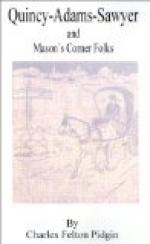In
manufactures, too, we’re some;
Take
rubber shoes and chewing gum;
In
cotton cloth, and woollen, too,
In
time we shall outrival you;
Our
ships with ev’ry wind and tide,
With
England’s own will sail beside,
In
ev’ry port our flag unfurled,
When
the Stars and Stripes will rule the world.
Chorus:
III.
For
gold and silver, man and woman,
For
things that’s raided, made, dug, or human,
’Meriky’s
the coming nation;
She’s-bound
to conquer all creation!
Per’aps
you call this brag and bluster;
No,
’taint nuther, for we muster
The
best of brain, the mighty dollar;
We’ll
lead on, let others foller.
Chorus:
Professor Strout sang the solo part of the song himself. The singing society and many of the audience joined in the chorus. Like many teachers of vocal music, the Professor had very little voice himself, but he knew how to make the best possible use of what he did possess. But the patriotic sentiment of the words, the eccentric make-up of the singer his comical contortions and odd grimaces, and what was really a bright, tuneful melody won a marked success for both song and singer. Encore followed encore. Like many more cultured audiences in large cities the one assembled in Eastborough Town Hall seemed to think that there was no limit to a free concert and that they were entitled to all they could get. But the Professor himself fixed the limit. When the song had been sung through three times he ran up the centre aisle of the platform and facing the audience, he directed the chorus, holding the variegated baton in one hand and swinging his woolly plug hat around his head with the other. At the close, amid screams, cheers, and clapping of hands, he turned upon his heel, dashed through the door and disappeared from sight.
The next number upon the programme was a piano solo by Miss Tilly James. Nothing could have pleased her audience any better than the well-known strains of the ever popular “Maiden’s Prayer.” In response to an encore which Quincy originated, and dexterously led, Miss James played the overture to Rossini’s “William Tell” without notes. A fact which was perceived by the few, but unnoticed by the many.
At the close of these instrumental selections, the Professor reappeared in evening costume and again assumed the directorship of the concert. Robert Wood had a ponderous bass voice, which if not highly cultivated was highly effective, and he sang “Simon the Cellarer” to great acceptation. Next followed a number of selections sung without accompaniment by a male quartette composed of Cobb’s twins, who were both tenors, Benjamin Bates, and Robert Wood. This feature was loudly applauded and one old farmer remarked to his neighbor, who was evidently deaf, in a loud voice that was heard all over the hall, “That’s the kind of music that fetches me,” which declaration was a signal for another encore.




